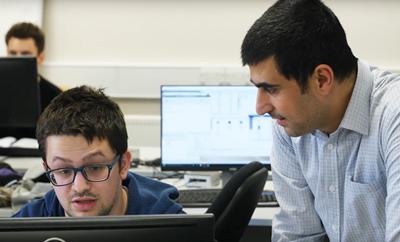
Dr Basel Halak, a renowned leader in Electronics and Electrical Engineering education at the University of Southampton, has been awarded a prestigious UK National Teaching Fellowship.
The National Teaching Fellowship (NTF) Scheme, organised and managed by Advance HE, celebrates and recognises individuals who have made an outstanding impact on student outcomes and the teaching profession in higher education. This year marks the 20th anniversary of the NTF Scheme.
Dr Halak has made an outstanding contribution through the development and delivery of courses on secure embedded systems, which inspired many students to pursue a career in this field. He consistently shares his expertise and experiences in the pursuit of enhancing electronic engineering education across the globe to students from all backgrounds and privileges.
"I am honoured to receive this prestigious fellowship, and very grateful to my students and colleagues, from around the globe, who have given me their support in pursuit of this Fellowship," said Dr Halak.
"The emphasis in achieving this award was based on my work on building an inclusive learning environment that allows students from all background to achieve their maximum potential, as well as on devising new learning resources and pedagogic approaches to keep up with fast-paced development in the field of electronics engineering," Dr Halak explained.
"The greatest benefit of this award is that it will connect me to a national network of excellent educators and previous winners, which will greatly support my work and create opportunities for career development," he concluded.
Professor Mark E Smith, President and Vice-Chancellor of the University of Southampton said: "I would like to warmly congratulate Dr Halak on winning this National Teaching Fellowship, which follows his success in 2016 of winning a Vice-Chancellor's Teaching Award. He can be very proud of this national recognition.
"A truly great university needs to be fully committed to teaching alongside producing world class research," Professor Smith continued. "External validation of the high quality of our teachers is provided through the award of this National Fellowship, giving strong evidence of Southampton delivering on being a dual excellence university."
Dr Halak is the director of the embedded systems and IoT (Internet of Things) programme at the University of Southampton, a visiting scholar at the Technical University of Kaiserslautern in Germay, a visiting professor at the Kazakh-British Technical University, an Industrial Fellow of the Royal Academy of Engineering and a Senior Fellow of the Higher Education Academy.
He has written over 80-refereed conference and journal papers, and authored three books, including the first textbook on Physically Unclonable Functions. His research expertise includes the evaluation of security of hardware devices, the development of appropriate countermeasures, the development of mathematical formalism of reliability issues in CMOS circuits (e.g. crosstalk, radiation, ageing), and the use of fault tolerance techniques to improve the robustness of electronics systems against such issues.
Dr Halak lectures on Digital Design, Hardware Security and Cryptography, supervises a number of MSc and PhD students, and is Southampton's Electronics and Computer Science Exchange Coordinator. He also leads the European Masters in Embedded Computing Systems (EMECS), a two-year course run in collaboration with Kaiserslautern University and the Norwegian University of Science and Technology in Trondheim.
Dr Halak serves on several technical program committees such as HOST, IEEE DATE, IVSW, ICCCA, ICCCS, MTV and EWME. He is an associate editor of IEEE Access and a guest editor of the IET circuit devices and system journal. He is also a member of the hardware security-working group of the World Wide Web Consortium (W3C).
Dr Halak joins an excellent group of colleagues at Southampton who have also received National Teaching Fellowships, including Sally Curtis and Scott Border (Medicine), Simon Kemp (Geography and Environmental Science), Judith Holloway (Medicine), James Wilson (Health Sciences), David Read (Chemistry) and Mike Wald (Electronics and Computer Science).






